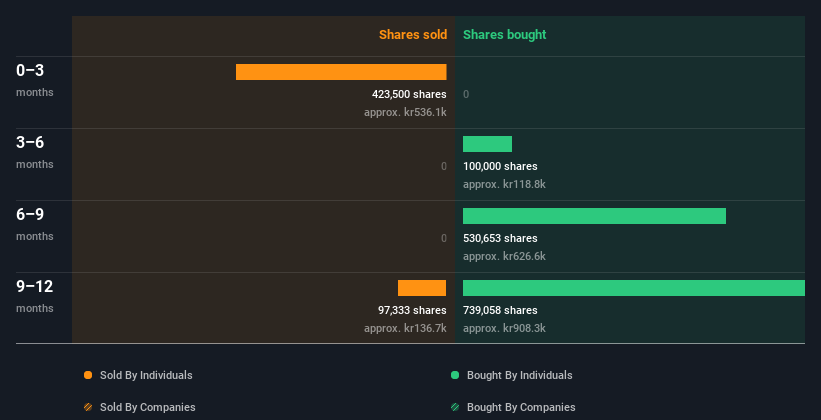
We note that the KebNi AB (publ) (STO:KEBNI B) Chief Financial Officer, Andreas Larsson, recently sold kr536k worth of stock for kr1.26 per share. While that isn't a lot of money, it was a substantial 100% of their holding, so certainly isn't a good sign.
See our latest analysis for KebNi
KebNi Insider Transactions Over The Last Year
In the last twelve months, the biggest single purchase by an insider was when Independent Director Jan Wareby bought kr620k worth of shares at a price of kr1.17 per share. So it's clear an insider wanted to buy, even at a higher price than the current share price (being kr1.17). While their view may have changed since the purchase was made, this does at least suggest they have had confidence in the company's future. To us, it's very important to consider the price insiders pay for shares. Generally speaking, it catches our eye when insiders have purchased shares at above current prices, as it suggests they believed the shares were worth buying, even at a higher price.
Over the last year, we can see that insiders have bought 1.37m shares worth kr1.6m. But they sold 520.83k shares for kr673k. In the last twelve months there was more buying than selling by KebNi insiders. The chart below shows insider transactions (by companies and individuals) over the last year. If you want to know exactly who sold, for how much, and when, simply click on the graph below!

KebNi is not the only stock that insiders are buying. For those who like to find winning investments this free list of growing companies with recent insider purchasing, could be just the ticket.
Insider Ownership Of KebNi
Looking at the total insider shareholdings in a company can help to inform your view of whether they are well aligned with common shareholders. A high insider ownership often makes company leadership more mindful of shareholder interests. It appears that KebNi insiders own 33% of the company, worth about kr104m. This level of insider ownership is good but just short of being particularly stand-out. It certainly does suggest a reasonable degree of alignment.
So What Do The KebNi Insider Transactions Indicate?
An insider sold stock recently, but they haven't been buying. In contrast, they appear keener if you look at the last twelve months. And insider ownership remains quite considerable. So the recent selling doesn't worry us. In addition to knowing about insider transactions going on, it's beneficial to identify the risks facing KebNi. At Simply Wall St, we found 5 warning signs for KebNi that deserve your attention before buying any shares.
If you would prefer to check out another company -- one with potentially superior financials -- then do not miss this free list of interesting companies, that have HIGH return on equity and low debt.
For the purposes of this article, insiders are those individuals who report their transactions to the relevant regulatory body. We currently account for open market transactions and private dispositions of direct interests only, but not derivative transactions or indirect interests.
Valuation is complex, but we're here to simplify it.
Discover if KebNi might be undervalued or overvalued with our detailed analysis, featuring fair value estimates, potential risks, dividends, insider trades, and its financial condition.
Access Free AnalysisHave feedback on this article? Concerned about the content? Get in touch with us directly. Alternatively, email editorial-team (at) simplywallst.com.
This article by Simply Wall St is general in nature. We provide commentary based on historical data and analyst forecasts only using an unbiased methodology and our articles are not intended to be financial advice. It does not constitute a recommendation to buy or sell any stock, and does not take account of your objectives, or your financial situation. We aim to bring you long-term focused analysis driven by fundamental data. Note that our analysis may not factor in the latest price-sensitive company announcements or qualitative material. Simply Wall St has no position in any stocks mentioned.
About OM:KEBNI B
KebNi
Develops, manufactures, markets, and sells 4-axes stabilizing VSAT antennas for maritime applications under the KebNi Maritime brand.
Reasonable growth potential with adequate balance sheet.


